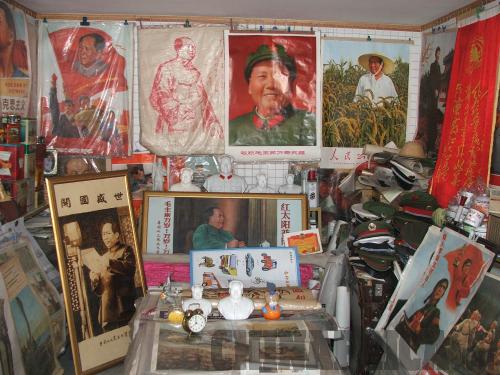|
 |
|
FRANCISCO LITTLE |
As the nation opens its arms to commemorate the 90th Anniversary of the Communist Party of China on July 1, 2011, historic items spanning the past decades are changing hands with fervor matching that of the Olympics' souvenir hunters in 2008.
And leading the memorabilia-pack by a country mile is anything bearing the familiar face of Chairman Mao Zedong.
Whether the revered father of the nation is adorning a porcelain bust, silk scarf, coffee mug or the face of a wristwatch seems to make no difference to collectors. As sales show, quantity slams quality every time.
It's known as the "Red Collection" and can include a range of historic items that represent the People's Republic from its beginnings in 1949 to the end of the "cultural revolution" in 1976. Visit any tourist site across the city and before you can say "Little Red Book," an enterprising tout appears to offer you a Mao pin, pen or pendant.
Mao a one-man industry
Likewise, across Beijing every gift shop worth its salt has invested in Mao.
Down on the trading floor of south Beijing's massive Panjiayuan market, entire shops are dedicated to Mao souvenirs. In one I spotted a collection of Mao badges. The shop owner rose from his slumber and beamed at me.
"Chairman Mao everywhere," he said waving his arm in an expansive gesture. He was right. Bookmarks, engraved photos and old-style suits; Mao is a one-man industry.
And prices are not cheap by any means. The owner, who identified himself as Mr. He, said he had noticed how demand for Mao items had risen in the past year, but especially as the 90th Anniversary on July 1 drew closer. It is almost like people wanted Mao near them when they celebrated the big day, he mused.
A large brass bust of Mao overshadowed ceramic statues of him saluting in the familiar stiff arm pose, against a backdrop of carefully stacked Little Red Books.
Although these books are copies and are ubiquitous around Beijing, He said anyone lucky enough to find a mint condition edition of the Great Helmsman's quotations would pay an arm and a leg.
He lowered his voice conspiratorially, looked around slowly for effect and said he could get me the real deal for $1,000. I declined, saying I already had a copy. He sniffed the air, unimpressed.
The shop had a shrine-like feel and on second glance the owner even looked a bit like Mao. Or was that his ghost lurking about admiring all the kit?
I bought a small tin Mao pin badge for $4. The ceramic statues were selling for $35. Porcelain versions could fetch prices of anything up to $3,000, and are much sought after by serious collectors.
".. It was too good to pass up .."
The book section of the market is festooned with Mao posters, going for $3 each. I watched as a foreign buyer bought out the entire stock of at least 100 posters from one shop. The seller showed no emotion as she pocketed the wad of notes and I wondered if this kind of sale happened daily?
"What are you going to do with them," I asked the buyer. "Sell them in Amsterdam, and also use them for wallpaper," he said smiling. He also showed me a nicely bound collection of Mao's selected poems that he picked up for $5, a gift for a friend back home.
On the other side of Beijing at the more trendy 798 Art District, Mao items compete with other arty gifts. One gallery sells canvas backpacks prominently displaying a picture of Mao. Below his image is the famous slogan "Serve the People," in Mao's handwriting. The packs sell for $30.
Storekeeper Kathy said young people are buying the packs to use as fashion handbags. She said her "red" sale items are brisk this year, as people want to identify with the 90th Anniversary.
"Young people think Mao is cool," she said shyly. Tourists buy a lot too, according to Kathy, who showed me a Mao adorned cigarette tin and red star cap that are very popular. One of the tackiest items had to be a Mao cigarette lighter that plays the tune The East Is Red, when lit. It was too good to pass up.
Online, sales for red items can be found on countless websites from local expat blogs selling cufflinks for $75 to Amazon.com offering collectors posters for under $40.
As I was paying for my lighter, I realized that Mao's image is seen daily on perhaps the most important item of life in China - the currency. He stared up at me as I handed over a red 100-yuan ($15.4) note. One thing is certain: the former leader is big business whichever way you look at it. And you can take that to the bank.
(The author is a South African living in Beijing) |